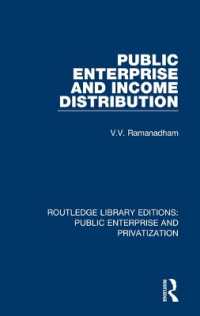Full Description
Routledge Handbook of Social Cohesion in Africa explores the meaning of social cohesion in an African context, comparing and historicizing empirical findings from across the continent as well as prioritizing African knowledges in interrogating institutional actors and policy environments.
Social cohesion is closely associated with processes of peacebuilding and development, and many scholars and international institutions consider it a precondition, or necessary component, for the building of resilient collectives or institutions. However, the term remains vague and difficult to pin down, and it has been criticized as serving a pacifying and even anti-political function in certain contexts. There is an empirical gap when it comes to studying how the concept is approached in and for the African continent. Drawing on cutting-edge original research, this handbook addresses the empirical, intellectual, and pragmatic complexities and limitations, as well as affordances, of social cohesion and related concepts. Key theoretical contributions and case studies from across the continent are used to problematize a Western-centric approach to social cohesion and to bring in kindred African concepts, such as asabiyyah (North Africa), Gadaa (Ethiopia), and ubuntu (Southern Africa). The book considers how different institutional actors are measuring social cohesion in Africa and investigates selected state and non-state policies on social cohesion.
Based on critical, post-colonial thinking throughout, this book will be an important resource not only for policy-makers but also for researchers and academics working in African studies; sociology; politics; global development; queer and gender studies; and conflict, peace, and security studies.
Contents
Preface 1. Capturing Social Cohesion Section 1: Social Cohesion and Related Concepts 2. Social Capital 3. Resilience: Strengthening Resilience and Social Cohesion through a Portfolio Approach in Borderland Development 4. Trust: Barriers to Governance Mechanisms for Facilitating Trust and Belonging in South African Cities Section 2: African Knowledge on Social Cohesion 5. Unveiling the Weave: Social Cohesion in African Post-Colonial State- and Nation-Building 6. Two Types of "Group Feeling": Ibn Khaldun's Asabiyyah and Its North African Legacies 7. Gadaa and Social Cohesion: Ethiopia 8. Social Cohesion in Guinea: Is It Not True That the Tongue and Teeth Rub Together in the Mouth Without Ever Tearing? 9. Social Cohesion or Tattered Bonds: Reimagining the Family Regulation System 10. Performing Peace in Francophone West Africa: Discourses of Cohésion Sociale in Côte d'Ivoire, Senegal, and Burkina Faso 11. Vivre-ensemble among Anglophones and Francophones in Cameroon: A Historical Challenge Section 3: Measuring Social Cohesion 12. Elections on the Edge: How Lack of Social Cohesion Fuels Political Violence in Côte d'Ivoire 13. Social Cohesion in Kenya: The Complexities of Developing a National Social Cohesion Index 14. Social Cohesion in Fragile and Conflict-Affected Settings: Insights from a Barometer in Northern Mozambique 15. The History, Methodology, and Impact of the South African Reconciliation Barometer 16. Reflecting on a Framework for an African Measure of Social Cohesion 17. Measuring Social Cohesion in Africa: An Empirical Overview from the Afrobarometer and the World Values Survey Section 4: The Policy Environment for Social Cohesion 18. Inequality and Social Cohesion in Africa 19. Is Social Cohesion the Panacea for Populism? 20. Dynamics of Inclusion and Exclusion: Islam in Sub-Saharan Africa 21. Jihadism and Social Cohesion 22. Contested Social Cohesion in Independent Namibia 23. Ideological Contestations over Social Cohesion: The Case of Somali Refugees at the Dadaab Camps, Northeastern Kenya 24. On Centering Black Male Performativities: Social Cohesion in Recent African Diaspora Online Activism 25. Corporate Social Responsibility in the Mining Sector and its Contribution to Social Cohesion in Botswana 26. Social Cohesion through Sports in Africa 27. Transitional Justice and Social Cohesion 28. Social Cohesion in South Africa through the Lens of Queer Justice, Incorporating Ubuntu Section 5: Policies of Social Cohesion 29. The Political Economy of Social Cohesion: The Role of African Regional Organizations and International Donors 30. Social Cohesion in Development Cooperation Policies and Practices 31. Queering Community Kitchens toward Safer Spaces through Social Cohesion: Narrative Research in Cape Town, South Africa 32. Bottom-Up Social Cohesion Policies in Western and Central Africa: Experiences and Challenges 33. Social Cohesion after War in Northern Ethiopia: Transitional Justice and National Dialogue as Security Issues 34. "This Is Now the Time to Beat Our Swords into Ploughshares": Mugabe, Race, and the Politics of Social Cohesion in Zimbabwe 35. South Africa's State-Led Social Cohesion and Nation-Building Project Concepts, Cosmologies, and Contexts of Social Cohesion Politics in Africa 36. Concepts, Cosmologies, and Contexts of Social Cohesion in Africa








